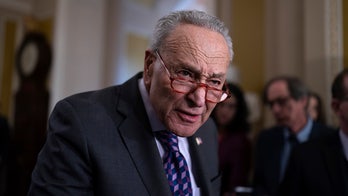President Obama's West Point speech laying out his strategy in Afghanistan seems to have boosted support for his handling of the issue.
Nearly half of Americans -- 49 percent -- say they approve of the job Obama is doing on Afghanistan, a solid increase from 41 percent approval in mid-October, according to the latest Fox News poll.
The national telephone poll was conducted for Fox News by Opinion Dynamics Corp. among 900 registered voters from December 8 to December 9, 2009. The poll has a 3-point error margin.
Almost six in 10 Americans -- 58 percent -- approve of the president’s plan to send 30,000 additional U.S. troops to Afghanistan, while a little over one-third -- 36 percent -- disapprove. This is a dramatic jump from the 42 percent who approved of the generic idea of sending "additional" troops back in mid-November.
Majorities of Democrats (55 percent), Republicans (62 percent) and independents (59 percent) all support the Afghan troop surge -- a notable jump in support from the president’s Democratic base.
An even higher percentage of Americans (62 percent) support the plan to begin removing U.S. troops from Afghanistan in 2011. However, a slim 51 percent majority of voters disapprove of the president putting both of these elements (the surge and the withdrawal plan) in the same speech.
A closer look at the two elements of the president's plan shows that about one-third of all voters (32 percent) approve of both the surge and the withdrawal timetable, about one in five (21 percent) approve the surge but not the timetable, and slightly more than one-quarter (27 percent) disapprove of the surge but approve the withdrawal plan.
Also, a solid plurality of Americans (48 percent) thinks that setting a withdrawal timetable will encourage the Taliban to wait until U.S. troops leave the country. Alternatively, almost four in 10 (37 percent) think the timetable will motivate the Afghan people to take control of their own security.
A sizable 69 percent majority of Americans think the president would revise his plans in 18 months if things in Afghanistan go poorly, while 22 percent think the president would stick to his original plan of removing troops even if the war effort begins to deteriorate.
Americans do express a fairly high degree of faith in Obama's ability to make strategic decisions -- with 54 percent expressing some degree of confidence. On the other hand, a substantial 45 percent of voters express lesser degrees of confidence in his strategic decision-making ability.
Moreover, Americans prefer to hear about mission objectives from the top commander in Afghanistan, General Stanley McChrystal (66 percent) rather than Obama (21 percent).
Although Americans place the Afghanistan issue lower on their priority list (8 percent) than either fixing the economy (27 percent) or creating jobs (26 percent), it is an issue that provokes strong feelings. Part of the reason for this passion may be that people firmly believe the Afghan conflict is closely linked to U.S. security (83 percent) as well as a feeling that Al Qaeda (suspected of using portions of Afghanistan and neighboring Pakistan as a base of operations) is still serious about attacking the U.S. (85 percent).
The president's plan also seems to have allowed him to differentiate his policy from the previous administration. By a better than two-to-one margin, Americans think Obama is changing the Bush policies on Afghanistan (61 percent) rather than continuing them (30 percent).
The number of Americans who think the president has "clearly explained" what the U.S. is trying to achieve in Afghanistan has increased to 41 percent, up from 26 percent who felt that way in October. Even so, a 53 percent majority does not think the administration has given a clear explanation.
One of the elements involved in a major troop surge is, of course, cost. It is estimated that each American soldier on the ground in Afghanistan costs upwards of a million dollars a year. When posed with a choice between instituting a "war tax" to pay for these costs or cut domestic programs, many more Americans choose program cuts (47 percent) over new taxes (28 percent).
Click here to view the raw data
Ernie Paicopolos is a Principal at Opinion Dynamics Corporation




